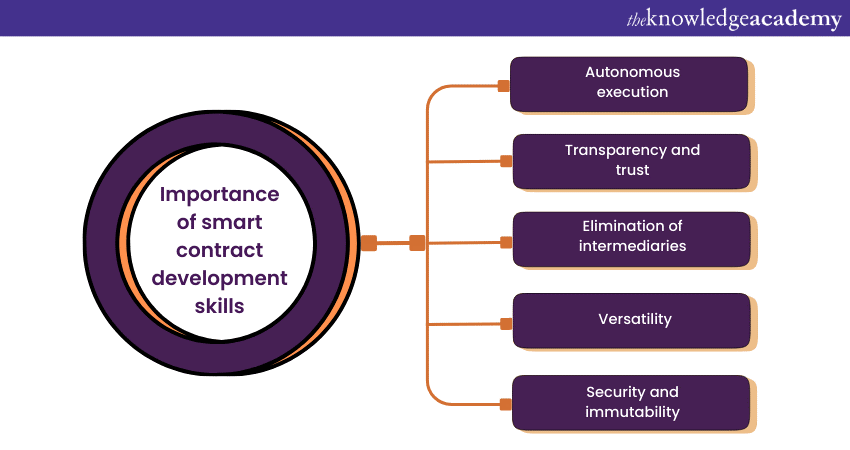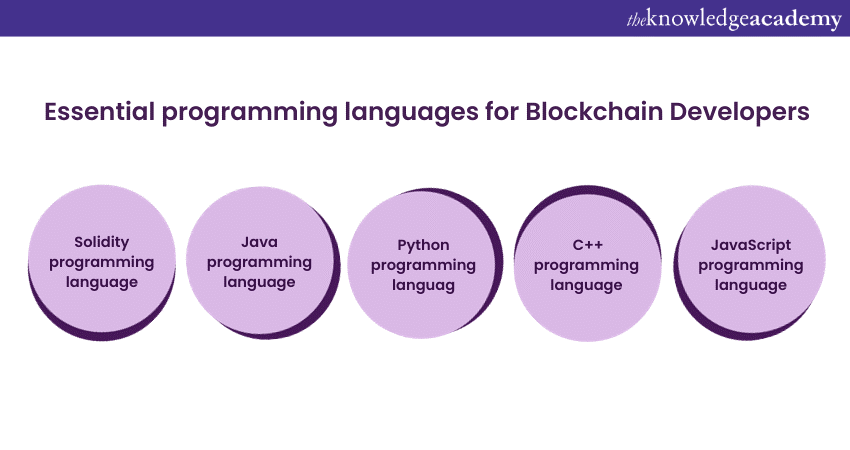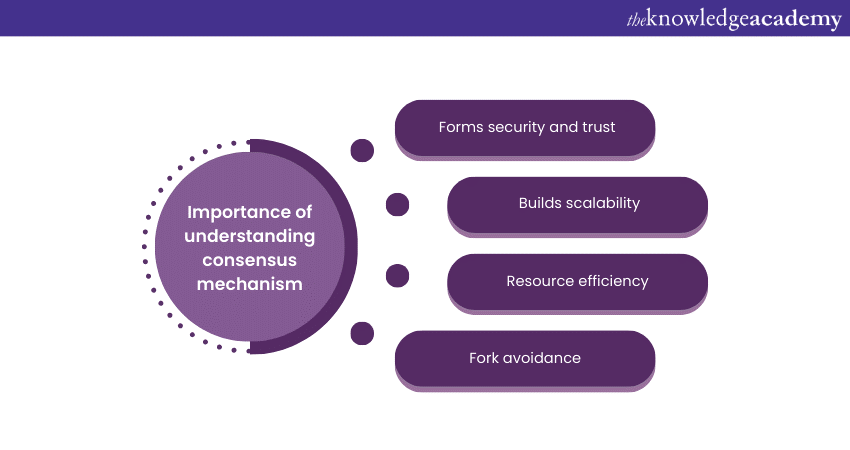We may not have the course you’re looking for. If you enquire or give us a call on 01344203999 and speak to our training experts, we may still be able to help with your training requirements.
Training Outcomes Within Your Budget!
We ensure quality, budget-alignment, and timely delivery by our expert instructors.

The transformative impact of Blockchain technology on data security and transparency has rushed the demand for skilled Blockchain Developers. Yet, within the broad spectrum of Blockchain technologies and tools, knowing where to channel your Developer efforts can be hard. Through this blog, we aim to discuss ten critical Blockchain Developer Skills necessary for success in this dynamic domain.
Table of contents
1) Essential Blockchain Developer Skills
a) Cryptography fundamentals
b) Smart contract development
c) Proficiency in decentralised systems and peer-to-peer networking
d) Blockchain platforms and tools
e) Mastery of a programming language
f) Experience with algorithm and data structures
g) Understanding of consensus mechanisms
h) Security awareness
i) Grasping norms and ecosystems
j) Token standards and token development
2) Conclusion
Essential Blockchain Developer Skills
In the fast-paced world of Blockchain technology, mastering a specific set of skills is essential for any aspiring Developer. These essential Blockchain Developer Skills lay the foundation for success in this dynamic and ever-evolving field.
Cryptography fundamentals
Understanding how decentralised networks function is foundational for any aspiring Blockchain Developer. Without this fundamental knowledge, success in the field is elusive. But what exactly is Blockchain technology? At its core, Blockchain is a distributed database that enables transparent, secure, and tamper-proof transactions. It operates by leveraging a peer-to-peer network to validate transactions and eliminating the need for intermediaries. This characteristic makes it an attractive solution for businesses seeking cost reduction and improved operational efficiency.
Furthermore, it's essential that a candidate demonstrates proficiency with multiple Blockchain platforms. Crafting an application for Ethereum, for instance, demands different expertise than creating one for Cosmos. An in-depth understanding of the various types of Blockchains and their specific use cases is invaluable.
Unlock your Blockchain development potential with our comprehensive Blockchain Training Course. Register now to embark on an exciting journey!
Smart contract development
Smart contracts are contractors within the Blockchain domain that represent a pivotal shift in the way agreements and transactions are executed. At their core, smart contracts are self-executing digital agreements that sum up the terms and conditions of a deal between two or more parties. The intriguing aspect of smart contracts is that these terms are not documented on paper but are instead encoded directly into the code.
Here's why smart contracts are so crucial in the Blockchain landscape:

1) Autonomous execution: Once deployed on a Blockchain, smart contracts operate autonomously. They automatically execute the terms of the agreement, leaving no room for human error or manipulation.
2) Transparency and trust: Smart contracts are stored on a decentralised ledger to ensure transparency and immutability. Every party involved can verify the terms and the execution of the contract, promoting trust.
3) Elimination of intermediaries: Unlike traditional agreements that often require intermediaries, smart contracts eliminate the need for third-party involvement. This not only reduces costs but also expedites the execution process.
4) Versatility: Smart contracts can be employed in various domains beyond finance, including real estate, supply chain, healthcare, and more.
5) Security and immutability: The terms of a smart contract are securely stored within the Blockchain, which makes them highly resistant to tampering and fraud.
6) Efficiency: Automation provided by smart contracts streamlines processes, reducing delays and enhancing operational efficiency.
Smart contracts are not merely a feature; they are a transformative force reshaping the way transactions and agreements occur within the digital world.
Proficiency in decentralised systems and peer-to-peer networking
Blockchain technology operates on the fundamental principle of decentralisation, meaning that no single entity holds centralised control or authority over it. In this context, comprehending the complexities of distributed systems and peer-to-peer networking is not merely advantageous but important when it comes to crafting Blockchain applications.
Distributed systems denote a network of interconnected computers that communicate and synchronise their operations by sharing messages. In essence, these systems are decentralised, unaffected by any central authority or single point of vulnerability.
The absence of a hierarchical structure is a defining feature within the Blockchain networks. Here, all nodes function as peers, ensuring that no singular point holds sway, control, or susceptibility to failure. As a Blockchain Developer, understanding these concepts is necessary for navigating the complexities of Blockchain development effectively.
Blockchain platforms and tools
Proficiency in Blockchain platforms and tools is crucial for Blockchain Developers due to several reasons:
1) Platform selection: Understanding various Blockchain platforms (e.g., Ethereum, Binance Smart Chain, Hyperledger) allows Developers to choose the most suitable platform for a given project based on its specific requirements, such as scalability, privacy, or consensus mechanisms.
2) Efficient development: Familiarity with Blockchain development tools, like Integrated Development Environments (IDEs), frameworks, and testing suites, streamlines the development process, making it more efficient and less error-prone.
3) Security and reliability: Knowledge of platform-specific security features and best practices is essential for building secure and reliable Blockchain applications. Different platforms may have unique security considerations.
4) Interoperability: Developers must understand how Blockchain platforms can interoperate with one another, especially in cases where cross-chain functionality is required.
5) Scalability and performance: Different platforms offer varying degrees of scalability and performance. Developers need to know how to optimise and scale their applications on the chosen platform.
6) Upkeep and maintenance: Staying updated with platform upgrades and changes is essential for maintaining and improving Blockchain applications over time.
Empower your future with our Blockchain training. Check out our Blockchain Training today to become a Blockchain expert and stay ahead in the technology revolution!
Mastery of a programming language
One of the most crucial Blockchain Developer Skills for a Blockchain Developer is a strong command of coding languages. Blockchain technology heavily relies on these languages, as Blockchain Developers are tasked with the creation of decentralised applications that operate on Blockchain networks.
These applications are constructed using smart contracts, which are self-executing computer programs responsible for automating contract execution between involved parties. To write these smart contracts, Blockchain Developers must possess a comprehensive grasp of programming languages such as Solidity, Java, Python, C++, and JavaScript.

1) Solidity Programming Language: Solidity stands as the preeminent programming language in the realm of Blockchain development. It's a language designed for crafting smart contracts on the Ethereum Blockchain, which is the most widely used Blockchain for decentralised applications. As a result, Solidity is an essential language for Blockchain Developers. It boasts several features that render it ideal for Blockchain development, including robust security checks, strong typing, and a syntax closely resembling JavaScript.
2) Java Programming Language: Java is another widely utilised programming language in Blockchain development. As a versatile language, it finds extensive use in enterprise applications. Java's popularity in the corporate sector makes it a careful choice for Blockchain Developers aiming to build applications for businesses. Its high level of security further improves its suitability for crafting Blockchain applications with stringent security requirements.
3) Python Programming Language: Python, a versatile, general-purpose language, enjoys widespread use across diverse fields, including Blockchain development. Its simplicity and user-friendliness render it an excellent choice for aspiring Blockchain Developers, particularly those new to programming. Python also benefits from a substantial Developer community, ensuring ample resources for those in need of assistance.
4) C++ Programming Language: C++ stands as a potent coding language frequently used in Blockchain development. It's a low-level language that permits direct memory access, which makes it ideal for constructing high-performance applications. Additionally, C++ plays a pivotal role in building the core components of many Blockchain protocols, establishing it as a must-know language for Developers delving into Blockchain infrastructure.
5) JavaScript Programming Language: JavaScript, a programming language commonly utilised in web development, also finds applications in Blockchain development for crafting decentralised applications meant to run in web browsers. Its popularity in web development renders it an excellent choice for Blockchain Developers aiming to create user-friendly decentralised applications with broader accessibility.
Experience with algorithm and data structures
Blockchain is a data structure that relies on cryptographic principles. Within the Blockchain, two general database types prevail: UTXOs (Unspent Transaction Outputs) in the Bitcoin network and account/balance models in the Ethereum network. For a Blockchain Developer, it's crucial to gain a deep understanding of these concepts, as well as the underlying data structures they employ.
Algorithms are a series of precise instructions that guide a computer in executing tasks and solving problems. Within the Blockchain industry, the application of algorithms is widespread, particularly in the context of consensus mechanisms. Notable consensus algorithms include Proof of Work (PoW), Proof of Stake (PoS), and Delegated Proof of Stake (DPoS).
Here's why a Blockchain Developer should be well-versed in the art of algorithm design and implementation:
1) Balances confirmation: Crafting algorithms to confirm balances within the Blockchain network ensures that transactions are accurately processed and user accounts remain in equilibrium.
2) Validation and transaction processing: Developers need algorithms to validate and efficiently process new transactions as they are written to the Blockchain, guaranteeing data accuracy and network integrity.
3) Consensus protocol implementation: Proficiency in designing and implementing consensus algorithms is essential for ensuring the security and trustworthiness of a Blockchain network.
4) Digital signature verification: Algorithms are essential for verifying digital signatures, a critical element in Blockchain security.
5) Application development: Writing applications that harness the data stored on the Blockchain requires the expert use of algorithms to interact with the Blockchain, retrieve data, and execute desired functions.
Understanding of consensus mechanisms
Understanding consensus mechanisms is crucial for Blockchain Developers for several reasons:

1) Security and trust: Consensus mechanisms are at the core of Blockchain security. They ensure that transactions are valid and agreed upon by network participants. Without a solid understanding of these mechanisms, a Developer cannot guarantee the security and trustworthiness of the Blockchain network.
2) Scalability: Different consensus algorithms have varying impacts on network scalability. Developers need to choose the right consensus mechanism to align with the project's scalability requirements. Inadequate knowledge in this area can lead to network performance issues.
3) Resource efficiency: Each consensus mechanism has different resource requirements, such as computational power or energy consumption. A Developer who understands these differences can make choices that optimise resource usage, making the Blockchain more efficient.
4) Customisation: Depending on the use case, Developers may need to create custom consensus algorithms or modify existing ones. Proficiency in consensus mechanisms is essential for tailoring the Blockchain to specific requirements.
5) Fork avoidance: An understanding of consensus mechanisms helps Developers avoid hard forks or chain splits, which can disrupt a Blockchain network. Knowledge in this area is crucial for maintaining network integrity.
6) Adaptation to use cases: Different applications require different consensus mechanisms. Developers must be capable of selecting or creating the most suitable mechanism for a given use case, whether it's a public Blockchain, private consortium, or specific industry application.
Security awareness
When it comes to Blockchain technology, security is the bedrock upon which the entire ecosystem stands. As a Blockchain Developer, possessing a profound understanding of security and cryptography is crucial. Here's why security expertise is indispensable in Blockchain development:
1) Cryptography proficiency: A strong grasp of cryptographic principles is essential. This includes a deep understanding of cryptographic hash functions, digital signatures, and encryption techniques. These elements form the bulwark of Blockchain security.
2) Risk assessment and mitigation: A Skilled Blockchain Developer should have the ability to identify and effectively look for security risks and vulnerabilities within Blockchain-based applications. Identifying weaknesses and potential attack vectors is crucial for strengthening the system against threats.
3) Compliance with standards: Familiarity with established security standards and protocols is vital, including SSL/TLS for secure communication, OAuth for authorisation, and OpenID for single sign-on. Compliance with these standards ensures robust security measures.
4) Security vulnerabilities awareness: Common security pitfalls encompass smart contract bugs, which can lead to substantial financial losses, as well as Denial-of-Service (DoS) and Distributed Denial-of-Service (DDoS) attacks, which can disrupt network operations. Knowledge of these vulnerabilities and the means to thwart them is a cornerstone in constructing secure Blockchain applications.
A Blockchain Developer's role goes beyond just creating applications; it involves safeguarding these decentralised networks from potential threats. Therefore, a Developer's ability to strengthen the Blockchain with robust security measures is of great importance.

Grasping norms and ecosystems
Understanding standards and ecosystems is crucial for Blockchain Developers because it allows them to navigate the complex and evolving landscape of Blockchain technology effectively. Here's why this skill is important:
1) Integration of best practices: Understanding industry standards and ecosystems allows Developers to integrate best practices into their Blockchain projects. This ensures that the applications and solutions they build are in line with established norms, making them more reliable and secure.
2) Efficiency and Optimisation: A Developer who understands the ecosystem can streamline the development process by leveraging existing tools, frameworks, and solutions. This leads to greater efficiency and faster development cycles.
3) Staying current: The Blockchain ecosystem is rapidly evolving with new standards, platforms, and technologies. Developers need to stay current to remain competitive. Understanding these ecosystems allows Developers to adapt and adopt the latest trends and technologies.
Token standards and token development
Blockchain Developer Skills involves a deep understanding of token standards and the ability to develop and manage tokens on Blockchain platforms. Tokens are digital assets that represent value, ownership, or access rights in Blockchain. They play a pivotal role in various applications, including cryptocurrencies, decentralised finance (DeFi), non-fungible tokens (NFTs), and more.
Blockchain Developers need to be proficient in token standards on the Ethereum platform, such as the ERC-20 and ERC-721 standards. These standards define how tokens should behave and interact within the Blockchain ecosystem. For example, ERC-20 tokens are fungible and are commonly used for cryptocurrencies, while ERC-721 tokens are non-fungible and are used to represent unique assets like collectables or digital art.
Conclusion
Beyond the technical expertise surrounding programming languages, smart contracts, etc., a Blockchain Developer should also nurture non-technical proficiencies like business acumen, effective communication, and problem-solving. These ten imperative Blockchain Developer Skills pave the way to becoming a versatile Blockchain Developer capable of constructing resilient and secure Blockchain solutions while comprehending business requirements and engaging with stakeholders proficiently.
Ready to harness the power of Ethereum? Register for our Ethereum Developer Training and elevate your Blockchain development skills to new heights.
Frequently Asked Questions
Upcoming Advanced Technology Resources Batches & Dates
Date
 Blockchain Training Course
Blockchain Training Course
Thu 11th Jul 2024
Thu 19th Dec 2024







 Top Rated Course
Top Rated Course


 If you wish to make any changes to your course, please
If you wish to make any changes to your course, please


